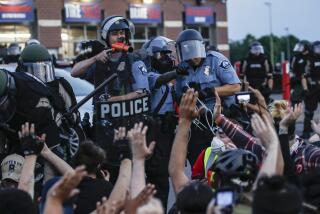Army reprimands soldiers for assaults
- Share via
The Army announced Friday night that it had given administrative reprimands to two Special Forces soldiers for assaulting detainees held at a base in eastern Afghanistan in 2003 and for failing to report the death of one detainee.
However, the U.S. Army Special Forces Command absolved the soldiers of any wrongdoing in the deaths of two detainees: an 18-year-old Afghan army recruit named Jamal Naseer who died after interrogation at the base in Gardez, and Wakil Mohammed, a woodcutter from the village of Wazi who was shot in the face during a search operation.
The command said in a statement that Army investigators had determined that a Special Forces soldier shot and killed Mohammed in self-defense.
Afghan witnesses dispute that Mohammed posed any threat to the soldier; they said he was pleading, without the help of a translator, not to be shot.
Both deaths were concealed from superiors until they were revealed by The Times beginning in 2004.
The statement from Special Forces Command in Ft. Bragg, N.C., did not name the soldiers who had been disciplined, nor did it provide details about which death led to the disciplinary action for failure to report.
Both detainees died in March 2003 while in the custody of a team of soldiers from the 20th Special Forces Group of the Alabama National Guard.
The team was led by Chief Warrant Officer Kenneth C. Waller, who continues to work full time for the 20th Group headquarters and is currently serving in East Africa.
Numerous Afghans who saw Naseer’s body just before and after he died at the Gardez firebase described it as horribly bruised and swollen, showing signs of severe beatings and blunt trauma. But the Special Forces statement said that “all other allegations, to include voluntary manslaughter and aggravated assault of detainee Jamal Naseer, were found to be unsubstantiated.”
A number of other Afghans taken prisoner by the same Special Forces unit reported that they were kicked, punched and forced to maintain stress positions. Some of those allegations were supported by doctors who examined the detainees after they were moved from the Special Forces compound.
A lengthy investigation by the Army’s Criminal Investigation Command, which concluded two weeks ago, found probable cause to believe that the two soldiers had committed assault. The statement released Friday characterized the offense as “slapping detainees.”
The two soldiers each received a “General Officer Memorandum of Reprimand” -- an administrative punishment delivered without a criminal hearing. One Special Forces officer, speaking on condition of anonymity because he was not authorized to discuss internal military matters, described that penalty as “a high-level slap on the wrist” that typically prevents an officer from advancing up the ranks.
“It’s an indication that they didn’t think it warranted a court-martial or even nonjudicial punishment,” said Hy Rothstein, a professor at the Naval Post Graduate School.
Maj. James O. Gregory, a spokesman for Special Forces Command, said the command “takes all allegations of abuse seriously, ensuring that they are thoroughly investigated and appropriate action is taken.”
More to Read
Sign up for Essential California
The most important California stories and recommendations in your inbox every morning.
You may occasionally receive promotional content from the Los Angeles Times.










